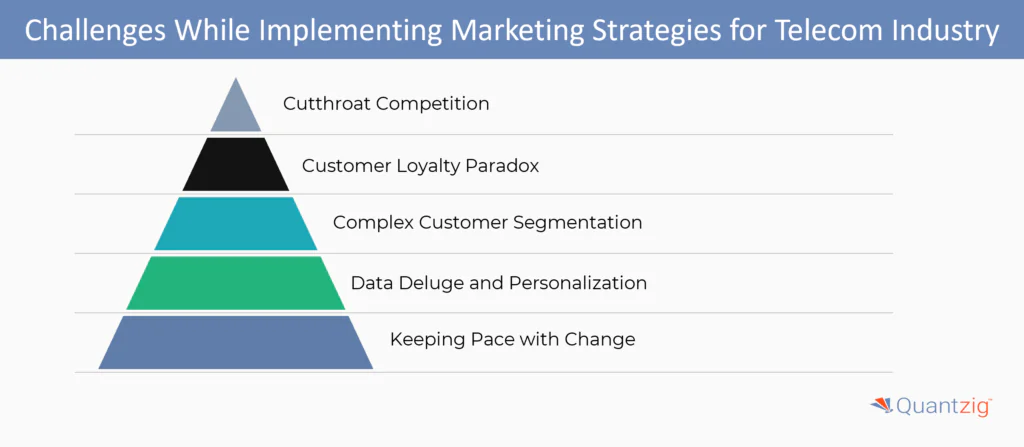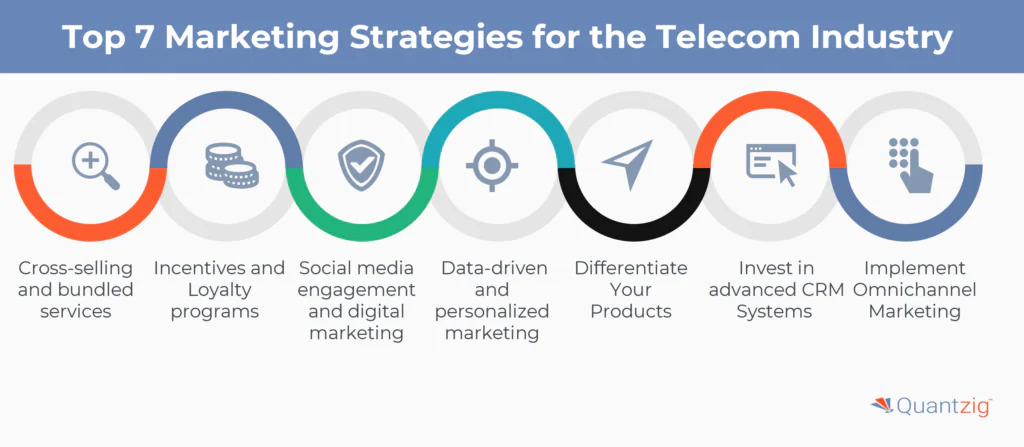Table of Contents
Key Takeaways
- A leading Telecom Service Provider headquartered in Europe experienced a 60% increase in increasing insights consumption by the key stakeholders, 20% higher lead conversion through targeted marketing campaigns, 40% increase in response to CTA campaigns, and 20% overall increase in new connection interest.
- The client was facing challenges due to a lack of proper data structuring and formatting, manual QC process, delayed insights and low-quality insights.
- Quantzig’s Marketing ROI Engine delivered actionable insights by leveraging advanced analytics to optimize targeted campaigns, personalize messaging, and enhance complaint resolution, thereby driving superior outcomes for marketing endeavors.
- Through an in-depth process of data extraction, enrichment, and processing utilizing cutting-edge AI and automated data management frameworks, our team ensured high-quality, structured data that powers its Intelligence layer, furnishing comprehensive insights across marketing campaigns.
Introduction to Marketing Strategies for Telecom Industry
Most companies and consumers use telecommunication every day, and that’s the reason creating the innovative marketing strategies that capitalize on this fact is a matter of survival. If the telecommunication marketing strategies of any company are accurate, they can stand to both win dissatisfied customers from others’ and reduce customer churn within their business.
Through the in-depth integration of domain expertise and cutting-edge technologies, Quantzig’s advanced telecom analytics solution empowers telecom companies to unlock the full potential of their data reservoirs, that drive strategic decision-making and unparalleled operational efficiency. Read this full case study to know our Automated Data Management Framework helped a telecom company to achieve a 60% increase in increasing insights consumption by the key stakeholders, 20% higher lead conversion through targeted marketing campaigns, 40% increase in response to CTA campaigns, and 20% overall increase in new connection interest.
Book a demo to experience the meaningful insights we derive from data through our analytical tools and platform capabilities. Schedule a demo today!
Request a Free DemoQuantzig’s Success Story
| Client Details | A leading Telecom Service Provider headquartered in Europe with annual revenue of $1Bn+. |
| Challenges Faced by The Client | The client was facing challenges due to a lack of proper data structuring and formatting, manual QC process, delayed insights and low-quality insights. |
| Solutions Offered by Quantzig | 1. Quantzig’s Marketing ROI Engine delivered actionable insights by leveraging advanced analytics to optimize targeted campaigns, personalize messaging, and enhance complaint resolution, thereby driving superior outcomes for marketing endeavors. 2. Through an in-depth process of data extraction, enrichment, and processing utilizing cutting-edge AI and automated data management frameworks, our team ensured high-quality, structured data that powers its Intelligence layer, furnishing comprehensive insights across marketing campaigns. |
| Impact Delivered | A 60% increase in increasing insights consumption by the key stakeholders, 20% higher lead conversion through targeted marketing campaigns, 40% increase in response to CTA campaigns, and 20% overall increase in new connection interest. |
Client Details
A leading Telecom Service Provider headquartered in Europe with annual revenue of $1Bn+.
Challenges Faced by the Client
Our client was facing multiple challenges regarding their present marketing strategies that led to ineffective marketing campaigns with dropping ROI. A wide range of data was coming from multiple sources which were integrated and further processed for marketing insights and dashboard. The key challenges our client was facing were:
1. Lack of proper data structuring and formatting led to low-quality data for any analytical process.
2. The QC was manual leading to inconsistent quality and slow delivery of quality data.
3. Delayed Insights and Low-quality of insights led to unactionable insights.
Solutions Offered by Quantzig
- We built a Marketing ROI Engine with the objective of producing actionable insights, focused on targeted campaigns, personalized messaging and better resolution of complaints leading to better results from any marketing campaigns.
- We looked at all the new sources to extract additional data, removed the data sources that was not adding any additional value and then passed all that data through our data enrichment engine which segregated the data, structured it in terms of data format, completeness etc.
- We used AI to perform data extraction and merged it with API led data. Post that extraction, we carried out data processing using our Automated Data Management Framework which was designed to ensure that most of our QC is automated leading to low effort and high-quality data and defined set of rules to automatically fix redundant and generic data issues. Enriched and Processed data was then passed through our Intelligence layer giving insights across marketing campaigns.
Impact Delivered
Our solution helped in increasing insights consumption by the key stakeholders by 60%. It helped the company to make more decisions based on our insights as compared to the earlier setup. In the span of 3-5 months, the client could see results in terms of higher lead conversion through targeted marketing campaigns by up to 20% an increase in response to CTA campaigns by 40%, and an overall increase in new connection interest by 20% as compared to the prior 6 months period of acquisition.
Also Read: Unleashing the Power of Telecom Analytics: Insights and Strategies
Get started with your complimentary trial today and delve into our platform without any obligations. Explore our wide range of customized, consumption driven analytical solutions services built across the analytical maturity levels.
Start your Free Trial TodayWhat is the Importance of Marketing Strategies for Telecom Industry?
In this competitive telecom industry, marketing helps in making a consumer-focused brand and therefore, an innovative marketing strategy helps telcos create a well-reupdated brand, attract more customers, and keep the existing ones happy to drive long-term business growth. By reaching customers on the proper channels, and using customer-centric data, telecom companies can stand out from the crowd and achieve success. Therefore, marketing strategies for the telecoms industry are essential for customer acquisition and retention, brand building, compliance, differentiation, and revenue growth in a competitive and dynamic market landscape.
Experience the advantages firsthand by testing a customized complimentary pilot designed to address your specific requirements. Pilot studies are non-committal in nature.
Request a Free PilotPotential Challenges While Implementing Marketing Strategies for Telecom Industry
Making a winning marketing strategy for the telecoms industry comes with its own set of hurdles. Here are some key challenges to consider:
1. Cutthroat Competition:
You will get a lot of competitors who are providing similar services in the telecom industry. Therefore, establishing a distinct market presence has become imperative in this sector. The marketing strategy should identify what sets you apart, whether it’s innovative value-added services, superior network reliability, or exceptional customer service.
2. Customer Loyalty Paradox:
While telecom services are highly essential, customer loyalty can be fleeting. Attractive introductory offers from competitors can easily entice customers to switch. This is the reason your marketing strategy should focus on building long-term customer relationships and exceeding ever-changing customer expectations to keep them loyal.
3. Complex Customer Segmentation:
Gone are the days of a one-size-fits-all approach. Nowadays, telecom customers exhibit diverse needs, preferences, and financial considerations that necessitate a nuanced approach to customer segmentation into your present strategies. If you effectively segment your target audience, it enables the delivery of tailored offerings and messaging that resonates with each distinct group.
4. Data Deluge and Personalization:
Everyday telecom companies generate a huge amount of customer data. The challenges lie in harnessing all these data effectively to personalize marketing and promotional campaigns. Marketing strategy for telecoms industry needs to ensure you’re leveraging customer data responsibly and ethically to deliver relevant offers or discounts without infringing on customer privacy.
5. Keeping Pace with Change:
This industry is constantly evolving with emerging consumer trends and new technologies rapidly. Therefore, your marketing strategy needs to be responsive and adaptable to stay ahead of the curve. Continuously monitor the market landscape and be prepared to adjust your approach as needed.
Key Benefits of Implementing Marketing Strategies for Telecom Industry
A powerful innovative marketing strategy fuels long-term success in the telecom industry. It attracts new customers with clear value propositions and retains existing ones through loyalty programs and targeted communication. This strategy builds a strong brand that resonates with your audience. By leveraging customer data, telcos can personalize offerings and stay ahead of the curve with ever-evolving industry trends and customer needs. In a nutshell, an accurate strategic marketing approach is the key to customer retention, acquisition, and sustainable growth for telecom companies.
Effective marketing strategies are essential for telecommunication companies aiming to navigate complex challenges such as churn reduction and capitalize on opportunities presented by OTT services and Voice over Internet Protocol (VoIP). Embracing digital marketing initiatives and leveraging data-driven marketing insights empowers firms to optimize the customer journey, enhancing engagement and retention. Strategic partnerships with providers like T-Mobile and integration with price comparison engines further amplify market reach. Embracing a Customer Led Growth strategy also ensures sustained success, driving long-term loyalty and revenue growth in this ever-evolving landscape.
Top 7 Marketing Strategies for the Telecom Industry
Marketing strategies are essential for global telecom brands to maintain relevance and sustain growth. With the advent of 5G technology, effective video marketing becomes pivotal in showcasing capabilities and attracting customers. Product differentiation and leveraging AI for personalized experiences are crucial for capturing market share and fostering brand loyalty. Net Promoter Score insights guide improvements in customer satisfaction, while referral marketing and reward programs enhance customer acquisition and retention. Investing in innovative strategies and fiber broadband infrastructure underscores the importance of strategic advertising spend to assert dominance among wireless carriers and utility providers in the evolving telecom landscape.
Telcos use a wide range of innovative marketing strategies to reach their potential customers. These strategies include:
Strategy 1. Cross-selling and bundled services
Telcos regularly bundle a variety of services including mobile phone plans, internet, and television to provide their customers with competitive pricing and comprehensive packages. This innovative strategy encourages a lot of customers to consolidate the telecom services with one single provider and enhances the perceived value of telecom service.
Strategy 2. Incentives and Loyalty programs
To retain existing customers and increase repeat business, many telcos’ companies provide loyalty programs. These loyalty programs can include discounts, rewards for long-term contracts, or exclusive access to new launching products or services. In some cases, existing customers can be rewarded for bringing in new referrals.
Strategy 3: Social media engagement and digital marketing
Telcos industry extensively uses various digital marketing techniques and tools, including email campaigns, social media platforms, and targeted online advertising. It has been found that these platforms allow this industry to reach a large number of audiences, directly engage with potential customers, and provide timely updates or promotions about new services.
Strategy 4: Data-driven and personalized marketing
By analyzing a huge amount of customer data, telcos can conduct personalized marketing campaigns tailored to individual audience preferences and usage patterns. This includes offering targeted promotions, customized plans, and recommendations based on the previous customer’s purchasing history.
Strategy 5: Differentiate Your Products
Leading companies strategically leverage several approaches to set their offerings apart. By prioritizing customer’s needs and understanding the dynamics of the customer journey, they tailor personalized marketing initiatives across multiple channels, with a keen eye on emerging digital platforms and the power of social media engagement. Augmented by data-driven marketing insights and sophisticated AI data analysis, they craft innovative telecom marketing strategies that resonate with diverse clientele.
Embracing cutting-edge technologies like Voice over Internet Protocol (VoIP) and preparing for the advent of 6G, they ensure their products stand out amidst competitors, while emphasizing trust through internet security software and strategic partnerships with mobile virtual network operators (MVNOs). This holistic approach, guided by a Customer Led Growth strategy, enables telecommunication companies to not only help in churn reduction but also optimize service revenues, ultimately securing their position as industry leaders.
Strategy 6: Invest in Customer Relationship Management (CRM) Systems
Investing in advanced CRM systems that improve service delivery and expedite customer interactions may help telecom organizations dramatically increase the effectiveness of their marketing campaigns. Telecom companies can now handle and analyze customer data more effectively thanks to modern CRM solutions, which improves segmentation and allows for more focused marketing efforts. By enabling tailored communication, these systems guarantee that clients receive pertinent updates and offers. CRM systems also assist in monitoring consumer interactions and comments, offering insightful data for ongoing development. Through more individualized and responsive marketing campaigns, telecom firms may increase customer loyalty, lower attrition, and boost overall satisfaction by utilizing CRM systems.
Strategy 7: Implement Omnichannel Marketing
To offer a consistent consumer experience across all touchpoints, telecom businesses must have a strong omnichannel marketing strategy. Telecommunications providers may develop a unified and consistent brand message by using platforms including social media, email, SMS, and in-store encounters. This strategy improves ease and happiness by enabling customers to interact with the brand through their chosen channels. Furthermore, omnichannel marketing makes it possible to track consumer journeys and preferences more effectively, which enables prompt and tailored responses. Engaging customers consistently across several channels builds stronger bonds with them and increases conversion rates.
What does the Future of Marketing Strategy for Telecom Industry Hold?
Telcos are increasingly focusing on leveraging their robust infrastructure and direct contacts with customers to drive innovation and enhance consumer experiences. Bundled services and cross-selling initiatives emerge as key tactics to maximize revenue streams and foster customer loyalty. Moreover, the strategic utilization of customer data, coupled with first-party intelligence, empowers telcos to deliver personalized offerings while adhering to privacy-first approaches. Mitigating churn rate remains paramount, with telcos employing advanced analytics to optimize ROI and enhance click-through rates. By gaining deeper audience insights, telcos can tailor marketing strategies to meet evolving consumer needs, ensuring relevance and effectiveness in an increasingly competitive landscape. As the industry continues to evolve, telcos are poised to embrace innovation and data-driven approaches to shape the future of marketing strategy and drive sustainable growth.
In the future of the telecom industry, affiliate programs will play a pivotal role in expanding market reach and driving customer engagement. With the integration of telco-verified IDs, telecom companies can offer seamless experiences across various platforms, ensuring winning customer experiences. As Americans increasingly rely on cellphones and smartphones, telecom firms will leverage data analysis to refine buyer personas and tailor email marketing campaigns. Prioritizing exceptional customer experience and responsive customer service will be paramount, shaping a future where telecom marketing strategies are driven by data-driven insights and a focus on delivering unparalleled value to customers.
Conclusion
In conclusion, crafting effective marketing strategies for telecom industry is pivotal for sustained long-term success amidst dynamic market landscapes and cutthroat competition. By embracing personalized marketing initiatives across multiple channels and digital platforms, and prioritizing customer’s needs, telecom companies can navigate challenges such as declining service revenues and customer churn. Besides, leveraging advanced technologies such as T-Mobile, Voice over Internet Protocol (VoIP) and AI data analysis, alongside strategic partnerships with mobile virtual network operators (MVNOs) and targeted local marketing efforts, facilitates differentiation and enhances customer journey experiences. Embracing a Customer Led Growth strategy, telecom firms can also foster long-term loyalty and drive sustainable growth in an ever-evolving industry landscape.






